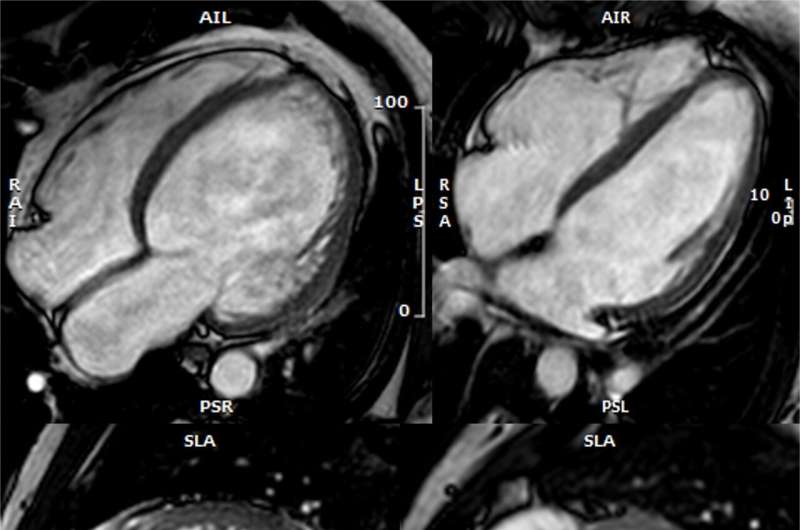MRI of the heart in a patient with dilated cardiomyopathy (left) and in a patient without heart disease (right). People with dilated cardiomyopathy have an enlarged heart with a reduced ability to pump blood. Image source: CNIC
Dilated cardiomyopathy is the most common cause of heart failure in young adults and the leading cause of heart transplantation. In this disease, the heart enlarges and reduces its ability to pump blood. People with dilated cardiomyopathy are at high risk for cardiac arrhythmias and sudden death.
Approximately 30% to 40% of patients with dilated cardiomyopathy have a genetic mutation that causes their disease. When a genetic cause is identified, the patient’s family members can be studied to determine whether they have also inherited the altered gene.
Family members of gene mutation carriers are at risk of developing the disease in the future, and regular examinations are recommended so that if signs of the disease appear, they can be detected in time and drug treatment can be initiated.
However, it remains unclear whether all family members who carry the culprit mutation will go on to develop the disease, at what age it is more likely to occur, and whether there are factors that can help identify those who may develop symptoms in the short term. incidence of disease and therefore who would benefit from closer monitoring.
The new study was led by Dr. Pablo Garca-Pava, researcher at the National Center for Cardiovascular Research (CNIC), director of the Spanish Cardiovascular Research Network (CIBERCV), and cardiologist at the Hospital Puerta de Hierro. The risk of dilated cardiomyopathy in carriers was first stratified.
A total of 25 Spanish hospitals took part in the study, which was published in Journal of the American College of Cardiology. Data were collected from more than 779 genetic carriers from 300 families who showed no signs of the disease before entering the study.
The researchers found that after a median follow-up of 37 months, nearly 11% of genetic carriers had developed the disease.
Research also shows that the onset of disease depends on the specific types of genetic mutations that are present.
In addition, Dr. Gakkar-Pava said, “We found that patients with this disease tend to share certain characteristics, such as older age, EKG changes, and an enlarged heart with a weaker pump, although these characteristics all Within the normal range.
“Patients with mutations in the sarcomere gene or those with signs of fibrosis in the heart detected by magnetic resonance imaging are also at higher risk of developing the disease,” Dr. Gakkar-Pava added.
“These results will allow us to provide more personalized care to genetic carriers who are asymptomatic of the disease,” said Dr. Eva Cabrera, a cardiologist at Porta de Hierro and the study’s lead author.
Currently, all genetic carriers receive similar care strategies, including annual or biannual checkups. “Now, we can schedule exams to meet the specific needs of individual patients: longer intervals for patients without risk factors, more frequent exams for patients at higher risk,” Dr. Cabrera said.
More information:
Penetrance of dilated cardiomyopathy in genotype-positive relatives, Journal of the American College of Cardiology (2024).
Provided by the Carlos III National Cardiovascular Research Center (FSP)
citation: Study provides first stratification of dilated cardiomyopathy risk in asymptomatic genetic carriers (2024, April 22), Retrieved April 22, 2024 https://medicalxpress.com/news/2024-04 – stratification-dilated-cardiomyopathy-symptom-free.html
This document is protected by copyright. No part may be reproduced without written permission except in the interests of fair dealing for private study or research purposes. Content is for reference only.
#Study #stratifies #risk #dilated #cardiomyopathy #asymptomatic #genetic #carriers #time
Image Source : medicalxpress.com
